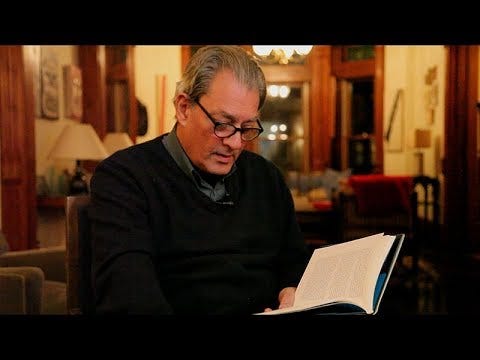C.S. Lewis's Advice to a Young Writer
The author of The Chronicles of Narnia offers some words of wisdom on writing.
C.S. Lewis responded to a young writer’s request for writing advice with eight useful and practical points.
I’m always on the lookout for how other writers write.
Everyone’s process is different and I can always glean some piece of information or inspiration from a writer’s process.
Let’s take a look.
Turn off the radio.
I think Lewis means to minimize distractions while writing, not to never listen to the radio (though perhaps he could mean that). Usually I find music distracting while writing as I’m completely focused on the words I’m trying to get down on the page but sometimes I can listen to instrumental music without vocals or lyrics.
Read all the good books you can, and avoid nearly all magazines.
Read, read, read. If you want to be a writer, you need to read. Read the classics. Read widely. Read what you enjoy. Perhaps Lewis has a certain disdain for magazines or thinks that magazine writing isn’t quality writing, but I’m sure we’ve all read some incredible magazine writing. But if you want to write novels, you need to read novels.
Always write (and read) with the ear, not the eye. You should hear every sentence you write as if it was being read aloud or spoke. If it does not sound nice, try again.
This is my favorite point. Sometimes I’ll write something then read it aloud and it doesn’t sound anything like me! Before publishing anything, I’ll always read it aloud first to see how it feels and sounds. This helps keep my ‘voice’ as well as keep the words honest.
Write about what really interests you, whether it is real things or imaginary things, and nothing else. (Notice this means that if you are interested only in writing you will never be a writer, because you will have nothing to write about.
Don’t write just for writing’s sake. Writing about stuff you like keeps it fun and interesting. Writing about something I’m not really interested in just feels like work.
Take great pains to be clear. Remember that though you start by knowing what you mean, the reader doesn’t and a single ill-chosen word may lead him to a total misunderstanding. In a story it is terribly easy just to forget that you have not told the reader something that he wants to know - the whole picture is so clear in your own mind that you forget that it isn’t the same in his.
This bullet is incredibly important and something I often struggle with while writing fiction. In my head, I have all this backstory and imagery, and when I write it down I’ll often miss the mark. The magic of books, especially fiction, is when an author creates a whole world that grabs me and I can pick up the book and I’m totally transported away.
When you give up a bit of work don’t (unless it is hopelessly bad) throw it away. Put it in a drawer. It may come in useful later. Much of my best work, or what I think my best, is the re-writing of things begun and abandoned years earlier.
Comforting words to new writers. You might think something is terrible but later you might read it and think, hey this isn’t so bad! This brings to mind Stephen King’s story of how his wife found his draft of Carrie in the trash and encouraged him to keep working on it. Also Joyce Carol Oates’s practice of finishing a manuscript then letting it sit in a drawer only to be re-read months later with fresh eyes (and ears). This is encouraging advice to keep in mind for new writers.
Don’t use a typewriter. The noise will destroy your sense of rhythm, which still needs years of training.
I’m not sure exactly what Lewis means with this bullet. Does he mean that the sound of the typewriter doesn’t allow you to ‘hear’ your work either by speaking it while writing or reading? Perhaps Lewis thought it best to write by hand using pen and paper. I like the noise and rhythm of the typewriter while writing, something I’m missing while writing on a laptop.
Be sure you know the meaning (or meanings) of every word you use.
Use a dictionary! I’ve got a few dictionaries around to use while reading and writing. This reiterates Lewis’s point on being clear and choosing the best words to craft the picture in your mind for your reader.
Paul Auster: How I Became a Writer
Novelist, screenwriter, and filmmaker Paul Auster passed away earlier this year in April 2024. I wasn’t familiar with his work before reading a New York Times obituary. I haven’t had a chance to read his books but something tells me I will enjoy them. Recently I saw an interview with Auster which really resonated as I’m currently working on my own ficti…
Lewis’s advice is short, simple and concise. He focuses on sitting down, focusing, writing clearly and writing about what interests you. If at first you don’t succeed, don’t throw it out! You might be able to use it at a later date.
Thanks to C.S. Lewis for sharing those tips for all us writers. I wonder what the young writer did after receiving his response, if or how she applied his advice. Did she become a writer herself?
What are your favorite tips and tricks for writing?




